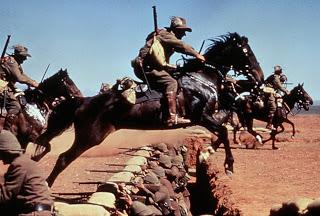 Simon Wincer's The Lighthorsemen (1987) is a rousing Aussie epic. There's none of Gallipoli's antiwar angst or Breaker Morant's burning injustice: it's a straightforward war movie, celebrating Australian heroism during the First World War.
Simon Wincer's The Lighthorsemen (1987) is a rousing Aussie epic. There's none of Gallipoli's antiwar angst or Breaker Morant's burning injustice: it's a straightforward war movie, celebrating Australian heroism during the First World War.British troops are stymied by Turkish forces before Gaza in 1917. After several failed frontal assaults, General Allenby (Anthony Hawkins) approves a bold plan: marching General Chauvel's (Bill Kerr) Desert Column, including the Australian 4th Lighthorse Brigade, across the desert to capture the wells at Beersheba. Among the Lighthorsemen are Dave (Peter Phelps), a newcomer who can't bring himself to kill anyone; Scotty (Jon Blake), a vulgar Irishman; Chiller (Tim McKenzie), the tough old boot; and Tas (John Walton), devoid of personality. Their melodramas play out as the Horsemen embark on their impossible missions.
The Lighthorsemen wants to be a patriotic epic, with its manly Diggers fighting Turks and thick-witted "Poms" alike. Wincer ennobles them from start to finish: between scenes of drinking and male bonding, he inserts more shots of cavalry silhouetted against the horizon than John Ford. Dean Semler's photography is relentlessly beautiful, from its desert landscapes through the sweeping action scenes. Further ennobled by Mario Millo's exultant score, Lighthorsemen celebrates its heroes as demigods.
Too bad the protagonists aren't very compelling. Screenwriter Ian Jones conceives Lighthorsemen's heroes in the blandest terms, ciphers matched by the bland cast. Only Dave gets a character arc, and a tired one at that; he proves himself a man by killing. A romance with a pretty nurse (Sigrid Thornton) adds another cliche. The other leads look good on horseback but make little impression. Macho camaraderie is a war move requisite, but Lighthorsemen's anemic interstitial scenes really try our patience.
Sans compelling heroes, we're drawn to side characters like General Chauvel, disgusted with British incompetence. (General Archibald Murray receives even less flattering treatment than Lawrence of Arabia, with characters calling him a "dunderhead.") Or Richard Meinertzhagen (Anthony Meinertzhagen), the eccentric intelligence officer who wields a knobkerrie and deceives the Turks with false documents. Deception also shapes the finale: the Turks are so convinced the Lighthorsemen, mere "mounted infantry," won't charge that they withhold fire until it's too late.
Wincer varies the action, from a railway demolition to an air raid. But everything's prelude to the finale, which ranks alongside Michael Curtiz's The Charge of the Light Brigade and Waterloo for the most glorious cavalry charge ever filmed. Wincer films the charge in glorious wide shot, hundreds of horses hurtling across the desert. This classical tableaux meets gory reality as machine guns and shrapnel decimate the Aussies; the survivors must dismount and fight hand-to-hand. Beautifully shot and perfectly staged, it's one of the all-time great battle scenes.
A great war movie, of course, offers more than mere spectacle: complex plot, interesting characters, thematic complications. By this yardstick, The Lighthorsemen's merely good: its story is weak and the characters dull, making the quiet scenes tolerable at best. Thank goodness the battle scenes are indisputably brilliant.

